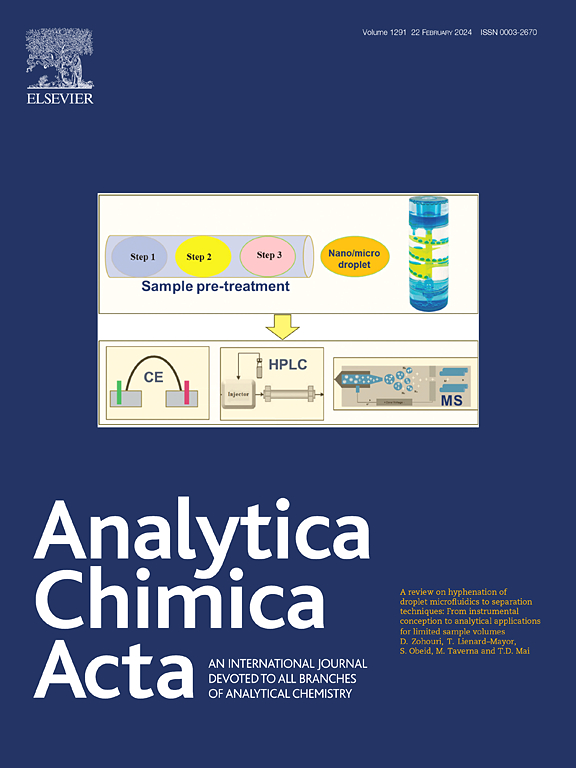利用聚苯乙烯微塑料颗粒-热裂解系统超简易提取核酸,快速检测鼻涕中的病原体
IF 5.7
2区 化学
Q1 CHEMISTRY, ANALYTICAL
引用次数: 0
摘要
呼吸道感染是全球死亡和残疾的主要原因,已成为公众关注的一个重要问题。核酸扩增检测(NAAT)已被公认为呼吸道感染诊断的金标准,在新冠肺炎疫情防控中发挥了关键作用。然而,核酸提取过程繁琐,限制了NAAT在呼吸道感染现场诊断中的应用,这是一种有效的疾病控制和预防手段。本文建立了一种聚苯乙烯微塑料颗粒(PSMP)-热裂解系统,在不牺牲传感性能的情况下,在4 min内简单快速地从鼻粘液中提取核酸。psmp -热裂解体系具有较强的蛋白质吸附能力,几乎消除了鼻黏液中蛋白质含量对扩增反应的干扰。此外,psmp -热裂解体系在检测蛋白含量为25.11 μg/μL的黏性鼻黏液中的目标病原体时,表现出良好的选择性和抗干扰能力,且灵敏度与常用固相萃取试剂盒相当。此外,实际使用调查表明,使用该系统的PCR检测方法可以通过检测临床鼻黏液样本中相应的病原体来准确识别呼吸道感染患者。该psmp -热裂解系统具有在各种呼吸道分泌物中检测病原体的潜力,有望大大简化呼吸道感染的分子诊断。本文章由计算机程序翻译,如有差异,请以英文原文为准。


Ultra-simple nucleic acid extraction using a polystyrene microplastic particles-thermal lysis system for rapid detection of pathogen in nasal mucus
Respiratory infections are a leading cause of death and disability globally and have become an important issue of public concern. Nucleic acid amplification test (NAAT) has been recognized as the gold standard for respiratory infection diagnosis, and played a critical role in epidemic control during the COVID-19 pandemic. However, the laborious nucleic acid extraction limits the application of NAAT in the on-site respiratory infection diagnosis, an effective approach for disease control and prevention. Herein, a polystyrene microplastic particle (PSMP)-thermal lysis system was established to extract nucleic acids from nasal mucus in 4 min simply and rapidly without sacrificing sensing performance. The PSMP-thermal lysis system showed a strong protein adsorption capacity, by which nearly eliminating the interference of protein content in nasal mucus on amplification reaction. Moreover, the PCR using this PSMP-thermal lysis system showed excellent selectivity and anti-jamming ability, as well as the high sensitivity comparable to that using commercial kits based on commonly used solid-phase extraction in detecting target pathogens in sticky nasal mucus with protein content of 25.11 μg/μL. Furthermore, the practical use investigation indicated the PCR assay using this system could accurately identify respiratory infection patients by detecting corresponding pathogens in clinical nasal mucus samples. This PSMP-thermal lysis system has the potential for pathogen detection in various respiratory secretions and is anticipated to substantially simplify molecular diagnosis of respiratory infections.
求助全文
通过发布文献求助,成功后即可免费获取论文全文。
去求助
来源期刊

Analytica Chimica Acta
化学-分析化学
CiteScore
10.40
自引率
6.50%
发文量
1081
审稿时长
38 days
期刊介绍:
Analytica Chimica Acta has an open access mirror journal Analytica Chimica Acta: X, sharing the same aims and scope, editorial team, submission system and rigorous peer review.
Analytica Chimica Acta provides a forum for the rapid publication of original research, and critical, comprehensive reviews dealing with all aspects of fundamental and applied modern analytical chemistry. The journal welcomes the submission of research papers which report studies concerning the development of new and significant analytical methodologies. In determining the suitability of submitted articles for publication, particular scrutiny will be placed on the degree of novelty and impact of the research and the extent to which it adds to the existing body of knowledge in analytical chemistry.
 求助内容:
求助内容: 应助结果提醒方式:
应助结果提醒方式:


